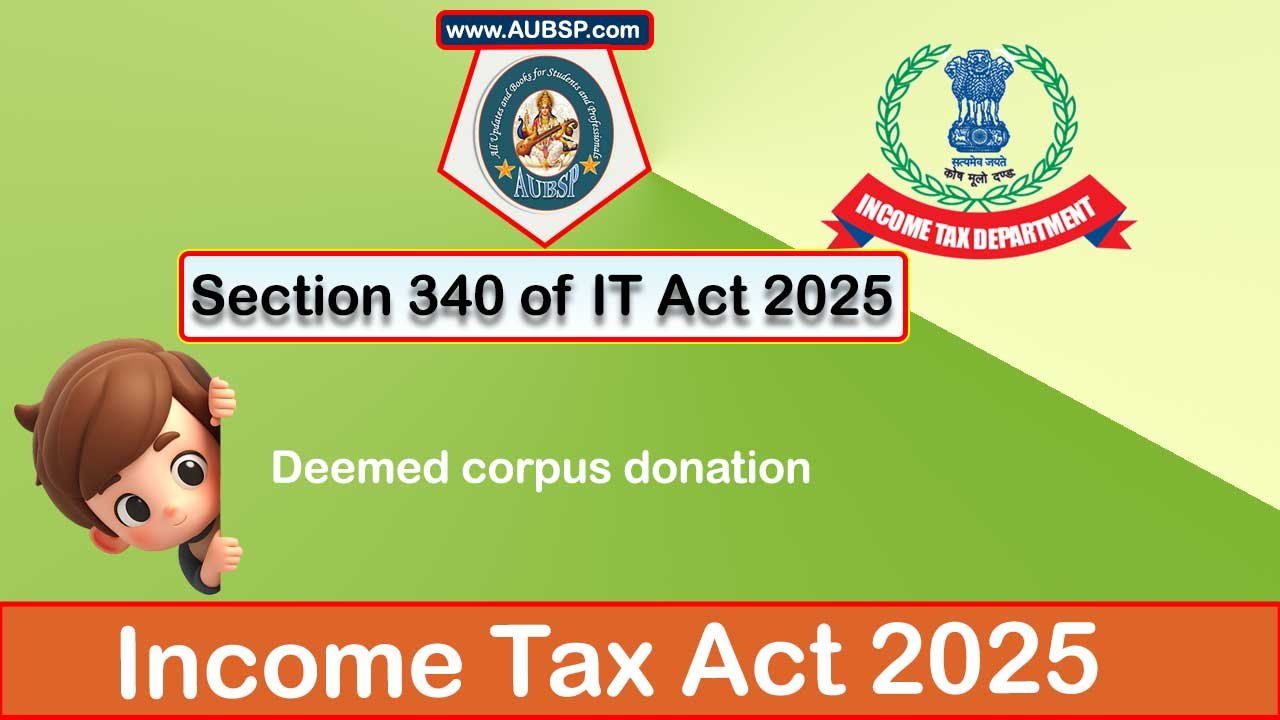Deemed corpus donation
[Section-340 as per the Income Tax Act, 2025 (this Act) w.e.f. 1st April, 2026.]
Where the property of a registered non-profit organisation includes any temple, mosque, gurdwara, church or other place notified under section 133(1)(b)(vii), any sum or sums received by such registered non-profit organisation as donation for the purpose of renovation or repair of such temple, mosque, gurdwara, church or other place, may, at its option, be deemed as forming part of the corpus under section 339, if it—
- (a) maintains such corpus as separate identifiable;
- (b) applies such corpus only for the purpose for which the contribution was made;
- (c) invests or deposits such corpus in any of the modes permitted under section 350; and
- (d) does not apply such corpus for making donation to any person.
FAQs on Section 340 of Income Tax Act 2025
What is Section 340 of the Income Tax Act, 2025 about?
Section 340 deals with deemed corpus donations received by registered non-profit organisations for the renovation or repair of certain religious places such as temples, mosques, gurdwaras, churches or other notified places.
Which organisations are eligible to treat donations as deemed corpus under Section 340?
Only registered non-profit organisations whose property includes a notified religious place under section 133(1)(b)(vii) are eligible.
What types of donations can be deemed as part of the corpus under this section?
Only donations specifically received for the purpose of renovation or repair of the religious place can be deemed as corpus donations under Section 340.
Is it mandatory for organisations to treat such donations as corpus?
No, it is optional. The organisation may choose to treat such donations as part of the corpus.
What are the conditions for a donation to be deemed as corpus under Section 340?
The donation must meet the following four conditions:
(a) The corpus must be maintained as separately identifiable;
(b) It must be applied only for the specific purpose for which the donation was made;
(c) It must be invested or deposited in the modes allowed under Section 350;
(d) It must not be applied for making a donation to any other person.
What does ‘separately identifiable’ corpus mean?
It means the corpus amount must be clearly segregated in the books and records and not mixed with other funds.
Can the corpus be used for other organisational activities?
No, it can only be applied for renovation or repair of the specific religious place for which the donation was received.
What happens if the corpus is used for donating to another person or organisation?
If the corpus is used for making donations to any person, it will not qualify as a deemed corpus under Section 340.
Is there a specific way to invest the corpus deemed under Section 340?
Yes, the corpus must be invested or deposited only in the modes specified in Section 350.
Can general donations received by a religious trust be treated as deemed corpus under Section 340?
No, only donations specifically made for renovation or repair of the notified religious place qualify under Section 340.
What is the benefit of treating such donations as corpus?
Deemed corpus donations are not required to be spent within the same year and are excluded from the income application requirement, allowing long-term financial stability for the repair or renovation work.
Is prior approval from the tax authorities required to treat donations as deemed corpus?
No, prior approval is not required, but all conditions under Section 340 must be met.
Can the corpus include both monetary and non-monetary contributions?
The provision refers to “sum or sums received,” which implies monetary contributions. Non-monetary contributions are not covered under this section.
From which date is Section 340 effective?
Section 340 is effective from 1st April, 2026.

